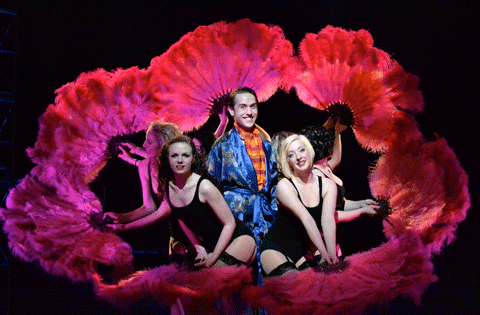Programs > Programs in the College of Performing Arts
Contacts Description Program Objectives Program Requirements
 Quick Links
Quick Links
Academic Plan
College of Performing Arts
Brind School of Theater
Liberal Arts Distribution
Contacts
Richard Stoppleworth \ rstoppleworth@uarts.edu \ 215.717.6455
Program Director
Description
The four-year Bachelor of Fine Arts Musical Theater Program prepares students as artists in the musical theater or for continued study in graduate school. The program defines “musical theater” in a way that embraces the richness and diversity of this evolving, challenging interdisciplinary art form that includes new and alternative forms of music theater, musical comedy, the musical play in the Hammerstein-Sondheim tradition, “Broadway opera,” cabaret and revue. Students receive the same acting technique training as acting majors in their first five semesters. This training is complemented by training in vocal technique, musicianship, dance, movement, musical theater practices and study of the repertoire of the musical theater in print, recordings, rehearsal and performance.
Actor training lies at the curricular heart of the two performance majors in the School of Theater Arts. The Freshman year revolves around 6 hours of acting studio weekly in which the student is introduced to the basics of behavior and acting through improvisation and the techniques outlined by Uta Hagen in “Respect for Acting” developing the students’ capacity to “live truthfully under imaginary circumstances” through sensory exploration and “object exercises” (“re-creating behavior which leads to the achievement of a simple objective.”) Improv is used as a technique to develop the students’ capacity to listen and respond, develop their imaginations and live in the moment. In the spring the class embarks on the “Explorer Project” which, leaning on the techniques developed in the fall, involves the study of all aspects of a Shakespeare play and the performance of scenes from that play. The Musical Theater major also explores and trains the actor’s response to musical literature in foundational classes in the Musical Theater Practices (M.T.P.) studio, individual voice lessons and weekly voice coaching. Dance and Music Skills classes, Survey of Theater and Script Analysis classes also support the Acting and M.T.P. studios.
The Sophomore year also involves 6 hours of acting studio in which the student is introduced to the Stanislavski approach to acting. The work and writings of Konstantin Stanislavski are the bedrock of the majority of contemporary psychological and text based acting techniques. Working through “action,” “imagination,” “units,” “objective” and super-objective,” the student is given the tools to analyze, break down and interpret text and character in a constructive and active way. This technique is applied to scene work from twentieth century American playwrights. The Musical Theater major continues to advance in the M.T.P. studio exploring the anatomy of the song and singer, voice studio and coaching, Music Skills, Dance and Theater History classes.
The Junior year continues with the Stanislavski technique in the fall semester as applied to the masters of Poetic Realism such as O’Neill, Chekhov and Ibsen. The Musical Theater Major engages in advanced training in the Musical Theater Practices studio exercising acting technique through song and scenes and Dance classes that support the work of the M.T.P. studios. Students continue training in the voice studios and coaching with more challenging and varied repertoire.
The Senior year engages the Musical Theater major in preparation for engagement in their pursuit as an artist and the theatrical community. Classes in Professional Preparation and Business of Theater help the student identify and prepare for that engagement as well as continue to train in the voice studio. The senior year is largely elective in design so the student can choose from a range of options. These might include Acting for the Camera, Scene Study, Cabaret Performance, New Musical Studios, Advanced Dance and Movement techniques, playwright based studios (Brecht, Beckett, etc), the creation of devised work, physical theater, Improvisation, Commedia dell’arte, Mask, Stage Combat and so on. There will also be opportunities for Independent Studies and Internships.
Program Objectives
Students graduating with a Bachelor of Fine Arts in Theater from the Musical Theater program will demonstrate all the competencies of the Acting major and in addition will:
- Understand how to analyze song, scene and play structure, identify dramatic conflict, and craft strong choices of action and tactic.
- Demonstrate authentic, believable and expressive singing/acting choices and behavior.
- Have a solid understanding of styles encountered in the American musical theater from its inception to the present, and be able to execute appropriate and expressive choices and behavior within those styles.
- Be able to reveal both a strong sense of self and a strong sense of character in performance as the material demands.
- Demonstrate a flexible, vibrant, and expressive voice capable of expressing power and nuance in a variety of styles.
- Be able to read/learn music independently based on a solid understanding of pitch and rhythm as well as musical form; have adequate mastery at the piano for the purpose of learning music.
- Be an articulate and expressive dancer with a strong technical foundation in ballet, jazz, tap and partnering; have clear understanding of the dance styles encountered in musical theater; learn steps quickly and execute choreography in all major musical theater styles.
Program Requirements (129 credits)